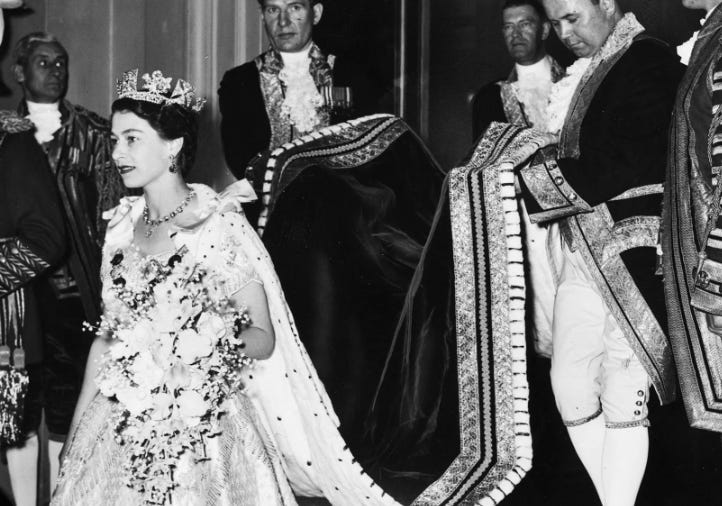"The Bloody Mary" by Susan Donnelly, from Capture the Flag. © Iris Press, 2009.
ORIGINAL TEXT AND AUDIO - 2012
The coronation of Queen Elizabeth I took place on this date in 1559. She had officially become queen two months before, upon the death of her half-sister, Mary Tudor. She was told of Mary's death at the Palace of Hatfield; legend has it that she was sitting under an oak tree at the time, and quoted the 118th Psalm: "It is the Lord's doing, and it is marvelous in our eyes."
The coronation was held at Westminster Abbey, and the banquet and festivities cost almost 17,000 pounds — around 3.5 million pounds in today's money. She spent the night of the 14th at the Palace of Westminster, and walked in procession along a blue carpet that ran from the palace to the abbey. John Dee, who was a mathematician and an astrologer, chose the date; he had consulted his star charts and determined it to be propitious.
The French playwright, actor, and manager Molière was baptized in Paris on this date in 1622. He was born Jean-Baptiste Poquelin to a wealthy family; his father was upholsterer to the king. His father wanted him to become a lawyer, but instead Poquelin took up with a theatrical family, the Béjarts, when he was 21. They formed a troupe and put on comedies, and he adopted the stage name of Molière. The theatrical life wasn't as lucrative as a law career, though. After serving time in debtors' prison, Molière and his company left Paris to tour the provinces for 13 years. They returned to Paris, triumphant, in 1658, after impressing the king's brother with their performance of The Amorous Doctor. Although he poked fun at the peasant and bourgeois classes, he was careful to leave the church and the monarchy alone; as a result, he never ran into trouble, enjoyed the patronage of Louis XIV — who was the godfather of Molière's first son — and always had work.
Known as the father of French comedic theatre, Molière wrote The School for Wives (1662), Tartuffe (1664), and The Misanthrope (1666). He collapsed onstage during a performance of his Le Malade Imaginaire (The Hypochondriac) in 1673; he finished the performance, but died of pulmonary tuberculosis later that night, and because there was no priest around to administer the Last Rites, he was denied a sanctified burial. After his widow appealed to the king, Molière was buried in the section of the cemetery reserved for unbaptized babies.
From Le Malade Imaginaire (1673): "Nearly all men die of their remedies, and not of their illnesses."
The British Museum opened to the public on this date in 1759. Located in the Bloomsbury district of London.
The museum was housed in a mansion, Montagu House; admission was free, and by appointment only, to "all studious and curious Persons." Anthony Trollope once said, "When a man wants to write a book full of unassailable facts, he always goes to the British Museum."
It's the birthday of the Reverend Dr. Martin Luther King Jr. (1929), born in Atlanta, Georgia. He was only 26 when he was elected to lead the Montgomery Improvement Association, the body that organized the Montgomery bus boycotts in 1955. After the success of the boycotts, he formed the Southern Christian Leadership Conference, which gave him a national platform for his mission to end segregation.
He wrote, "Just as Socrates felt that it was necessary to create a tension in the mind so that individuals could rise from the bondage of myths and half-truths to the unfettered realm of creative analysis and objective appraisal, so must we see the need for nonviolent gadflies to create the kind of tension in society that will help men rise from the dark depths of prejudice and racism to the majestic heights of understanding and brotherhood."
It was three years ago today, in 2009, that Chesley Burnett "Sully" Sullenberger successfully landed a passenger jet in the Hudson River. US Airways flight 1549 had taken off from New York's LaGuardia Airport, en route to Charlotte, when it ran into a flock of Canada geese near the George Washington Bridge. Both engines of the Airbus A320 were disabled, and the left engine caught fire. Sullenberger warned the passengers to brace for impact, and then made a water landing near the U.S.S. Intrepid museum adjacent midtown Manhattan. All 155 passengers and crew survived; Sullenberger was the last to exit, which he did after checking the cabin and retrieving the log book.
Be well, do good work, and keep in touch.®
Boom Town: A Lake Wobegon Novel read by Garrison Keillor (10 CDs)






Please notice that this is a REPOST of TWA from January 15, 2012. There's nothing wrong with the math. Nobody except the reader is responsible for updating the chronology.
Regular readers, even those who missed the announcement, will have figured out that only reposts have been appearing since late May 2022.
Lazy, inattentive, who knows what? Maybe just doesn't give a damn. These little gaffes are trivial but they suggest attitudes at TWA I hope are not really there. A quick proofread is all that's needed.